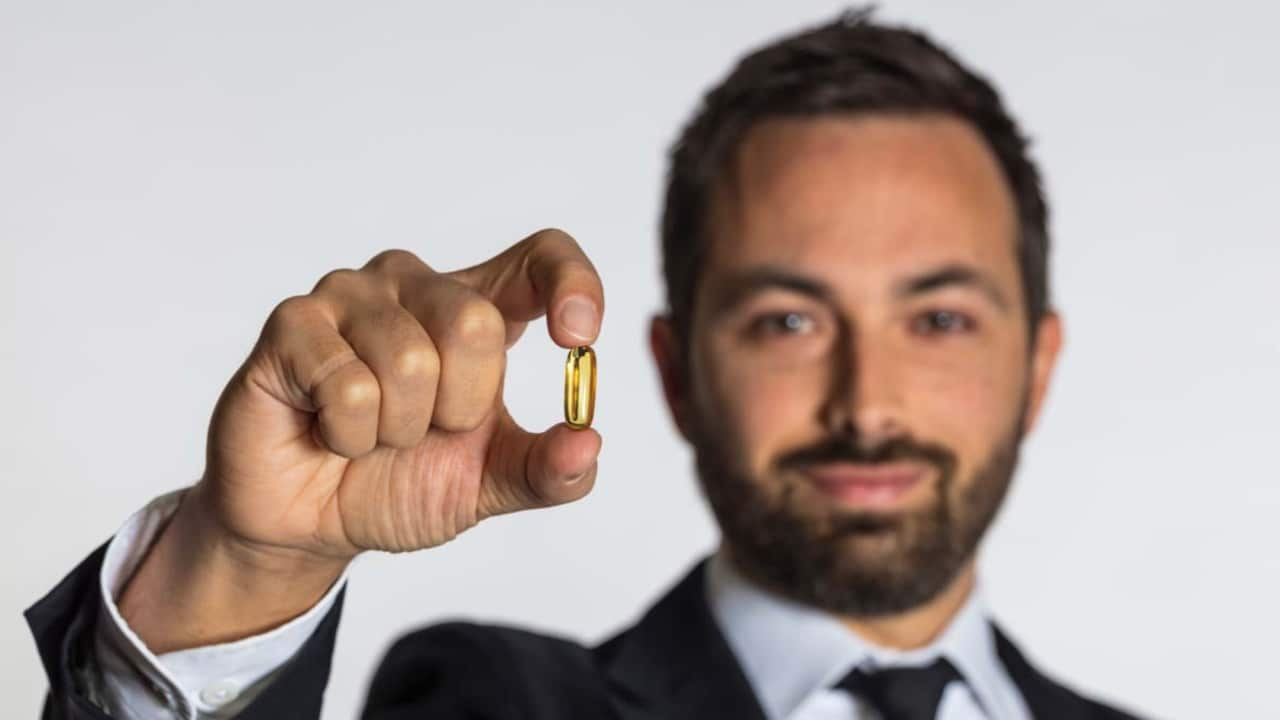Most of us have taken a vitamin tablet at some point in our lives. We even give them to our children to help boost their nutrition, prevent poor health and battle common illnesses. But how much do we actually know about vitamins and the contents of the vitamin supplements we buy, without restriction, at chemists and supermarkets?
The new 90-minute documentary, airing on SBS on Sunday 12 August at 8.30pm, seeks to explore the truth about vitamins. Hosted by scientist Dr Derek Muller the show reveals a few home truths about vitamins and the vitamin industry that you're probably not aware of.
1. Around a billion people pop vitamins pill, regularly
According to journalist and author of Vitamania, who spent five years investigating vitamins, the vitamin industry is worth about $40 billion a year in the USA and $100 billion world-wide.
It’s estimated that over 85,000 vitamin products and dietary supplements are currently on the market.
Almost one billion of us take a regular dietary supplement, mainly vitamin tablets.
2. An orange a day could keep sailor’s scurvy away
Scurvy, the scourge of sailors for centuries, is apparently making a comeback.
Muller discovers that just outside of Boston, there have been 30 documented cases of scurvy – that’s the largest collection of scurvy cases in wealthy countries, outside war or exceptional circumstances.
There have been 30 documented cases of scurvy – that’s the largest collection of scurvy cases in wealthy countries, outside war or exceptional circumstances.
Sonny Lopez, a 60-year-old resident of Springfield, Massachusetts who lives on the poverty line, was one of the rare cases diagnosed with scurvy resulting from severe vitamin C deficiency.
Prior to diagnosis, Sonny’s hair was thinning, his teeth had started to rot and he had extreme fatigue. However, he reversed his condition, under the guidance of primary care doctor at Baystate Medical Center, Dr Eric Churchill, who eventually prescribed him one orange a day. “One of the things as about scurvy is that it is really not difficult to prevent,” Dr Churchill tells Vitamania.
“One of the things as about scurvy is that it is really not difficult to prevent,” Dr Churchill tells Vitamania.

Sonny Lopez (pictured), a 60-year-old resident of Springfield in the USA, was diagnosed with scurvy resulting from a severe lack of dietary vitamin C. (Photo: Vitamania) Source: Vitamania
“Even something like a handful of ketchup packets a day have enough vitamin C in them to [reduce your risk of] scurvy. I don’t recommend that people get their vitamin C from ketchup packets, but it’s enough.”
Vitamin C is found in citrus fruits as well as kiwi fruits, red capsicums and strawberries.
3. You can take too many vitamins and get very sick as a result
Fat soluble ones vitamins (vitamins A, D, E and K) are stored in our liver and fatty tissues. If consumed in excess, they easily build up to toxic levels.
Excess levels of vitamin D caused baby Elizabeth Jackson from Omaha, Nebraska, to become so sick, she was dangerously close to kidney failure and potential death.
Excess levels of vitamin D caused baby Elizabeth to become very sick – she was dangerously close to kidney failure and potential death.
Her mother, Becky, tells Vitamania that when Elizabeth was born, she unknowingly fed her homemade, organic formula that contained toxic levels of vitamin D, causing high levels of calcium in the baby’s blood. However, once the child’s accidental poisoning was discovered, doctors were able to restore her health.
Elizabeth is now a healthy two year old with stable vitamin D and calcium levels.
4. Even if they are branded “natural”, vitamin pills can contain synthetic materials
The vast majority of vitamins produced today are synthetic, created in chemical factories. Most synthetic vitamins are chemically identical to the natural form but don’t have the fibre and nutrients that come with food.
“Believe it or not at least eight vitamins can be synthetically created from fossil fuel products like coal tar,” says Muller. “They contain components like acetone found in nail polish remover, short chain alkanes found in petrol and various aromatic rings found in bitumen.
“The idea is to rearrange the building blocks into a more complex chemical compounds, actually building vitamins.”
5. One week is all it takes for 75% of the vitamin C in an apple to be destroyed
Advanced Accredited Practising Dietician from Wollongong University, tells Vitamania that vitamin C in some foods is so fragile that it degrades with time.
One study shows that 75 per cent of vitamin C in an apple can be lost in one week.
“It’s affected by heat, light, storage conditions and lots of other different things,” Dr Probst explains.
To keep your apples fresher for longer, buy apples that are local to your area to ensure that part of their short shelf-life hasn’t expired during transportation. “The sooner you pick it and consume it, that’s probably the best.”
6. The vitamin D in most supplements comes from Aussie wool or sheep
“Today, most of the world’s vitamin D pills are created from the greasy wool of sheep – mostly Australian sheep,” Muller says in Vitamania.
Lanolin is a mixture of fatty acids produced by a sheep’s oil glands.
“Around 15 per cent of the lanolin is a form of cholesterol like the cholesterol under our skin. This is extracted and oxidised to produce a new compound radiated with ultraviolet light, transforming it into a precursor of vitamin D.
“This chemical process mimics the biological process of the sunlight hitting our skin. Several more steps create the end product – synthetic vitamin D.”
7. Synthetic vitamin D3 may be worth more than gold
Online, vitamin D3 sells for $50 AUD but packed in pill form, it sells for around $3,700 per gram.
“That makes vitamin D far more valuable than gold,” says Muller.
Vitamania premieres Sunday 12 August, 8.30pm on SBS. The documentary will be available after broadcast via . Join the conversation @Vitamaniamovie #Vitamaniamovie.








